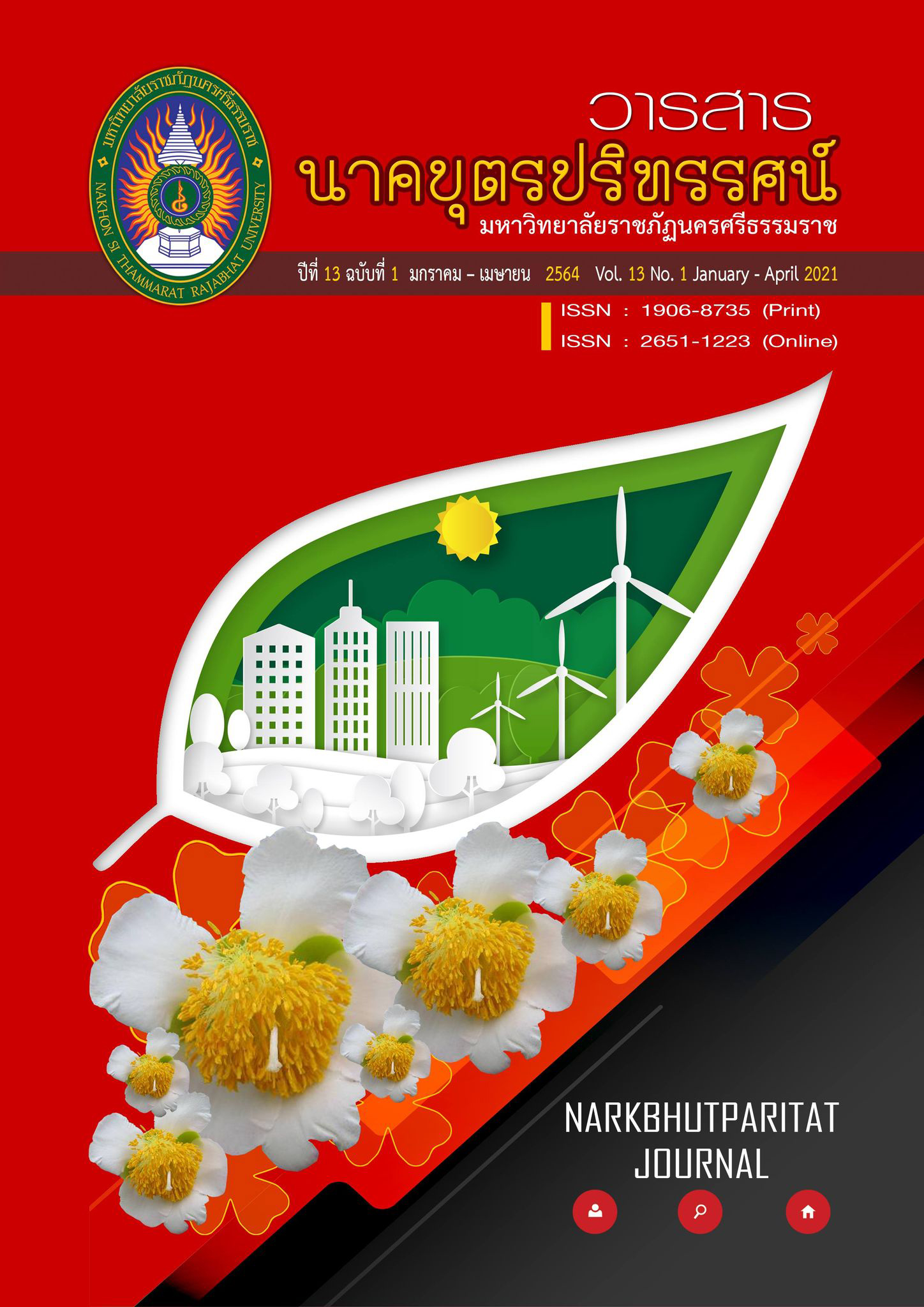A Study on Production Management of Asam Gelugur (Garcinia atroviridis) in Sai Khao Sub-district, Khok Pho District, Pattani Province, Thailand
Main Article Content
บทคัดย่อ
Production management of asam gelugur (Garcinia atroviridis) in Sai Khao sub-district, Khok Pho district, Pattani province, Thailand was studied. Thirty-five farmers were interviewed using questionnaires from August to September, 2019. The results showed that all of asam gelugur was Garcinia atroviridis. They were grown in low land (51.43%) which is a production land size of 1,600-3,200 square meters (65.71%). The growing density was 1-3 plants per farm. Mostly, the seeding method (97.14%) was used for Garcinia atroviridis planting. The plant grew in clay loam and sandy clay loam (34.29 and 34.29%, respectively) using rainwater (94.29%). The flowers bloomed from January to February (88.57%) and most fruits were produced in February. The harvest period was from July to September, with an average yield of 100-200 kg/rai/year. The postharvest management was in the form of sun-dried slices (82.86%), preserved slices (8.57%) and fresh fruit (8.57%) which net revenue were 12,600, 40,716 and 2,584.23 baht per year, respectively.
Article Details
เอกสารอ้างอิง
Abdullah, N. (1994). Pengasingan dan pencirian asid organic dalam Asam Gelugor
(Garcinia atroviridis). (Bachelor of Science Dissertation). University Pertanian, Malaysia.
Amran, A. A., Zaiton, Z., Faizah, O. and Morat, P. (2009). Effect of Garcinia atroviridis on
oxidative stress and atherosclerotic changes in experimental guinea pigs.
Singapore Medical Journal, 50(3), 295–299.
Chuah, L.O., Ho, W.Y., Beh, B. K. and Yeap, S. K. (2013). Updates on Antiobesity Effect of
Garcinia Origin (−) HCA. Evidence-Based Complementary and Alternative Medicine.1–17.
Clouatre, D. and Rosenbaum, M.E. (1994). The diet and health benefits of HCA
(hydroxycitric acid). New Canaan, CT: Keats Publishing.
Jayaprakasha, G.K. and Sakariah, K.K. (1998). Determination of organic acids in Garcinia
cambogia (Desr.) by high-performance liquid chromatography. Journal of Chromatography A, 806(2), 337–339.
Jena, B.S., Jayaprakasha, G.K., Singh, R.P. and Sakariah, K.K. (2002). Chemistry and biochemistry
of (-)-hydroxycitric acid from Garcinia. Journal of Agricultural and Food Chemistry, 50(1), 10–22.
Kerddonfaek, J. (2010). 140 miracle plant species reduce cholesterol in blood (p. 176–177).
Seven printing Bangkok.
Kosin, J., Ruangrungsi, N., Ito, C. and Furukawa, H. (1998). A xanthone from Garcinia atroviridis.
Phytochemistry, 47(6), 1167–1168.
Lewis, Y.S. and Neelakantan, S. (1965). α– Hydroxycitric acid – the principle acid in the fruits
of Garcinia cambogia Desr. Phytochemistry, 4(4), 619–625.
Lim, T.K. (2012). Edible medicinal and non-medicinal plants volume 2: Fruits. 21–28.
DOI 10.1007/978-94-007-1764-0_3.
Mackeen, M.M., Ali, A.M., Lajis, N.H., Kawazu, K., Hassan, Z., Amran, M., Habsah, M., Mooi, L.Y,
... Mohamed, S.M. (2000). Antimicrobial, antioxidant, antitumour-promoting and cytotoxic activities of different plant part extracts of Garcinia atroviridis Griff. ex T. Anders. Journal of Ethnopharmacology, 72(3), 395–402.
Miean, K.H. and Mohamed, S. (2001). Flavonoid (myricetin, quercetin, kaempferol, luteolin, and
apigenin) content of edible tropical plants. Journal of Agricultural and Food Chemistry,
(6), 3106–3112.
Nursakinah, I., Zulkhairi, H.A., Norhafizah, M., Hasnah, B., Zamree, M.S., Farrah, S.I., Razif, D.,
... Hamzah, F.H. (2012). Nutritional content and in vitro antioxidant potential
of Garcinia atroviridis (Asam gelugor) leaves and fruits. Malaysian Journal of Nutrition,
(3), 363–371.
Permana, D., Lajis, N.H., Mackeen, M.M., Ali, A.M., Aimi, N., Kitajima, M. and Takayama, H. (2001). Isolation and bioactivities of constitutents of the roots of Garcinia atroviridis.
Journal of Natural Products, 64(7), 976–979.
Permana, D., Lajisa, N.H., Shaaria, K., Alib, A.M., Mackeenb, M.M., Kitajimac, M., Takayamac, H.
and Aimic, N. (2003). A new prenylated hydroquinone from the roots of Garcinia
atroviridis Griff ex T. Anders (Guttiferae). Zeitschrift fur Naturforschung, 58(4), 332–335.
Phongpaichit, S., Rungjindama, N., Rukachaisirikul, V. and Saka-yaroj, J. (2006). Antimicrobial
activity in cultures of endophytic fungi isolated from Garcinia species. FEMS
Immunology and Medical Microbiology, 48(3), 367–372.
Ritthiwigrom, T., Laphookhieo, S. and Pyne, S.P. (2013). Chemical constituents and biological
activities of Garcinia cowa Roxb. Maejo Int. Journal of Science and Technology, 7, 212–
Rittirut, W. and Siripatana, C. (2006). Drying characteristics of Garcinia atroviridis. Walailak
Journal of Science and Technology, 3(1), 13–32.
Roongpisuthipong, C., Kantawan, R. and Roongpisuthipong, W. (2007). Reduction of adipose
tissue and body weight: Effect of water soluble calcium hydroxycitrate in Garcinia
atroviridis on the short term treatment of obese women in Thailand. Asia Pacific
Journal of Clinical Nutrition, 16(1), 25–29.
Royal Thai Survey Department and GEO-Informatics Research Center of Natural Resource
and Environment. (2019). Prince of Songkla University, Thailand. (in Thai).
Siripongvutikorn, S., Thongraung, C., Usawakesmanee, W., Buatoom, T. and Thammarutwasik, P.
(2009). Development of instant Garcinia (Garcinia atroviridis) tom-yum mix as a high
acid seasoning. Journal of Food Processing and Preservation, 33(1), 74–86.
Tan, W.N., Khairuddean, M., Wong, K.C., Khaw, K.Y. and Vikneswaran, M. (2014). New
cholinesterase inhibitors from Garcinia atroviridis. Fitoterapia, 97, 261–267.
Tee, E.S., Noor, M.I., Azudin, M.N. and Idris, K. (1997). Nutrient composition of Malaysian foods,
th, Institute for Medical Research, Kuala Lumpur. p.299.
Thuengsuk, S., Phomtasan, A., Phuekwivat, W., Phumchai ,T., Raksa ,N., Isama-ae, N., ...
Dumampai, N. (2015). Research and development on Malabar Tamarind production
Technologies in the Upper Southern. Department of agriculture. Thailand, 1–73. (in Thai).
Tisdale, E.J., Kochman, D.A. and Theodorakis, E.A. (2003). Total synthesis of atroviridin.
Tetrahedron Letters 44, 3281–3284.


